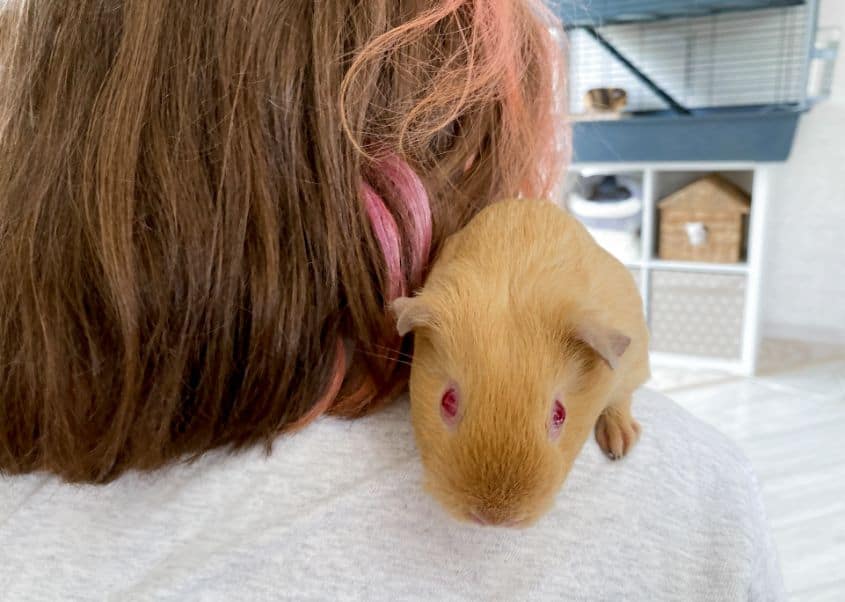Guinea pigs are adorable, friendly, and low-maintenance pets that have become increasingly popular over the years.
I have often been asked whether guinea pigs need salt licks. In this blog post, we will explore the truth behind this question and discuss alternative ways to provide your guinea pig with the necessary nutrients.

Salt Licks & Guinea Pigs
What Are Salt Licks?
Salt licks are blocks of salt that are often given to livestock as a way to provide them with the necessary minerals and trace elements that they need to maintain good health. These blocks can be made of various types of salts, including sodium chloride and calcium carbonate.
Why Do People Think Guinea Pigs Need Salt Licks?
There is a common misconception that guinea pigs need salt licks to maintain good health. This belief may stem from the fact that salt is an essential nutrient for many animals, including humans.
However, guinea pigs have different nutritional requirements than other animals, and their diets should be carefully balanced to ensure that they get all the nutrients they need.
The Truth About Guinea Pigs and Salt Licks
Natural Diet of Guinea Pigs
In the wild, guinea pigs are herbivores and primarily eat grass, hay, and other vegetation. Their natural diet is rich in fiber, vitamins, and minerals, including sodium. Therefore, they do not require additional salt in their diet.
Salt Content in Guinea Pig Food
Most commercial guinea pig foods are designed to meet the nutritional needs of these small animals. These foods contain a balanced mix of vitamins, minerals, and other essential nutrients, including sodium. Therefore, adding salt licks to their diet is unnecessary and can even be harmful.
Why Salt Licks Can Be Harmful to Guinea Pigs
Giving your guinea pig a salt lick can actually be harmful to their health. Excess salt consumption can lead to dehydration, kidney problems, and other health issues.
Additionally, the hard texture of salt licks can cause dental problems, which can lead to pain, discomfort, and difficulty eating.
Alternative Ways to Provide Your Guinea Pig with the Necessary Nutrients
Offering Fresh Vegetables and Fruits
One of the best ways to provide your guinea pig with the necessary nutrients is by offering them fresh vegetables and fruits.
These foods are rich in vitamins and minerals, including sodium, and are essential for maintaining good health. Some great options include leafy greens, carrots, bell peppers, and berries.
Providing a High-Quality Pellet Food
Another way to ensure that your guinea pig is getting all the necessary nutrients is by providing them with a high-quality pellet food.
These foods are specially formulated to provide guinea pigs with a balanced diet and are rich in vitamins, minerals, and other essential nutrients.
Giving Unlimited Access to Fresh Water
Finally, it is essential to provide your guinea pig with unlimited access to fresh, clean water.
This will help keep them hydrated and ensure that they are able to absorb all the necessary nutrients they need to maintain good health.
Conclusion
In conclusion, guinea pigs do not need salt licks to maintain good health. Their natural diet, combined with high-quality pellet food, fresh vegetables and fruits, and unlimited access to fresh water, will provide them with all the necessary nutrients they need to thrive.
While providing your guinea pig with a balanced diet is essential, there are other important considerations to keep in mind when it comes to their health. These include regular veterinary check-ups, a clean and safe living environment, and plenty of exercise and mental stimulation.
I always recommend that pet owners do their research and consult with a veterinarian before making any changes to their pet’s diet or lifestyle. By providing your guinea pig with the proper care and attention, you can ensure that they live a long, healthy, and happy life.
- How Long Do American Eskimo Dogs Live? Important Factors and Care Tips - September 29, 2023
- Do American Bulldogs Need Grooming? Essential Tips and Care Guidelines - September 29, 2023
- Do Bengal Cats Enjoy Playing? Essential Tips for Keeping Them Active - September 29, 2023